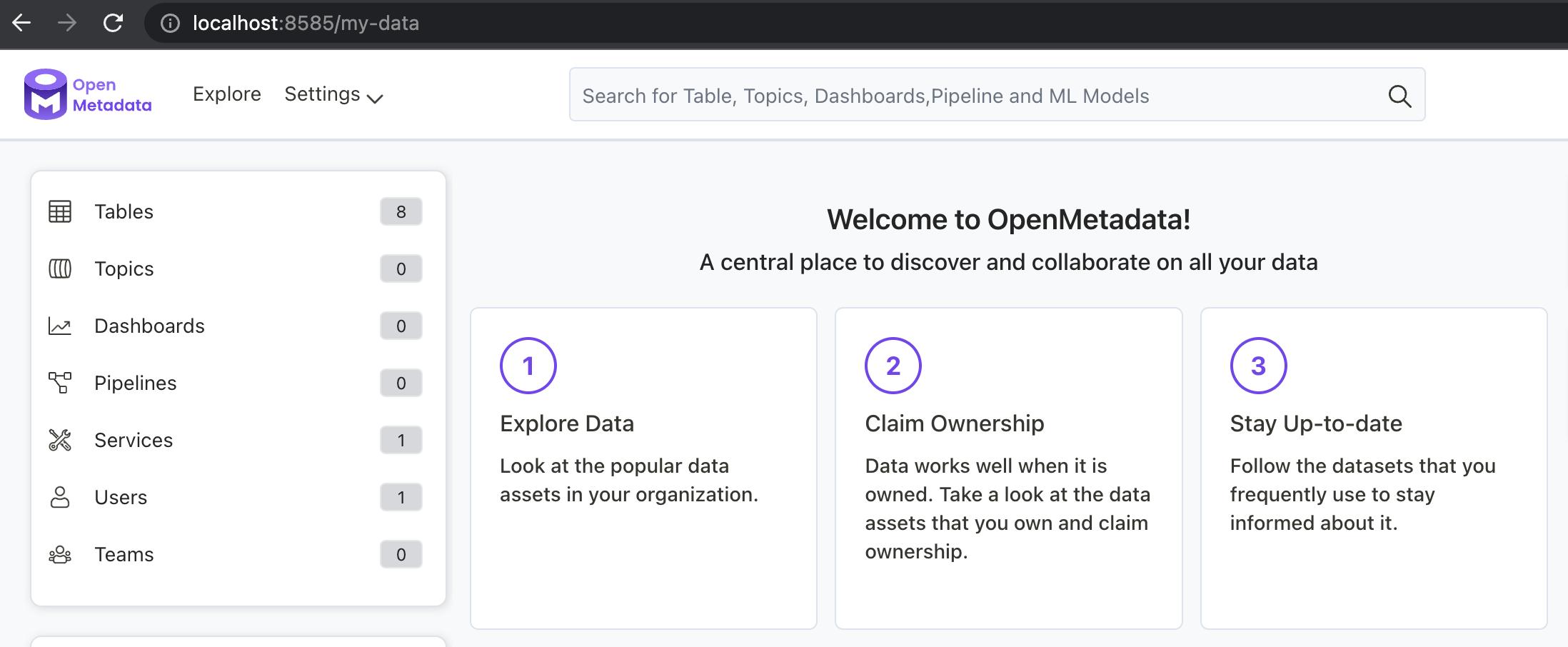Install OpenMetadata
Requirements
Please ensure your host system meets the requirements listed below:
- Python 3.8+
- Docker 20.10.0+
- Docker Compose
Installing OpenMetadata
Clone the prefect-openmetadata repository
First, clone the latest version of the prefect-openmetadata Prefect Collection.
Then, navigate to the directory openmetadata-docker containing the docker-compose.yml file with the minimal requirements to get started with OpenMetadata.
Start OpenMetadata containers
You can start the containers with OpenMetadata components using:
docker compose up -d
This will create a docker network and containers with the following services:
openmetadata_mysql- metadata store that serves as a persistence layer holding your metadata,openmetadata_elasticsearch- indexing service to search the metadata catalog,openmetadata_server- the OpenMetadata UI and API server allowing you to discover insights and interact with your metadata.
Wait a couple of minutes until the setup is finished.
To check the status of all services, you may run the docker compose ps command to investigate the status of all Docker containers:
NAME COMMAND SERVICE STATUS PORTS
openmetadata_elasticsearch "/tini -- /usr/local…" elasticsearch running 0.0.0.0:9200->9200/tcp, 0.0.0.0:9300->9300/tcp
openmetadata_mysql "/entrypoint.sh mysq…" mysql running (healthy) 33060-33061/tcp
openmetadata_server "./openmetadata-star…" openmetadata-server running 0.0.0.0:8585->8585/tcp
Confirm you can access the OpenMetadata UI
Visit the following URL to confirm you can access the UI and start exploring OpenMetadata:
http://localhost:8585
Login with username admin and password admin.
You should see a page similar to the following as the landing page for the OpenMetadata UI.

Why should you use Prefect for metadata ingestion?
The challenge with the metadata ingestion is to ensure that this process can be automated and can run reliably, either on a regular interval, or ad-hoc. This is where Prefect can help.
Prefect is a general-purpose orchestration and dataflow coordination platform allowing you to build, run, schedule, and operationalize your dataflow at scale. It supports both batch and streaming workflows and provides an excellent developer experience allowing you to run your flows locally and seamlessly move to production and to Cloud when you’re ready.
Among many other features, it natively supports:
- dynamic runtime-discoverable and modular workflows,
- passing data between tasks,
- running your workflows on various execution platforms (on-prem, cloud, Docker, Kubernetes, serverless containers, and more) while maintaining privacy via a hybrid execution model,
- scaling out for parallel and concurrent execution with async, Dask, and Ray,
- various integrations through Prefect Collections - such as this one!
Install Prefect
You can install Prefect and other dependencies needed for this integration using the command (run this from the home directory which prefect-openmetadata was cloned into):
pip install -r requirements.txt
To make sure that OpenMetadata logs are stored in the Prefect backend and displayed in the UI, run the following command:
prefect config set PREFECT_LOGGING_EXTRA_LOGGERS='Ingestion,OMetaAPI,Metadata,Profiler,Utils'
This way, Prefect is aware of the extra loggers from OpenMetadata.
Self-hosted Orion server
When you install Prefect, this will not only install the client library, but also an ephemeral API server and UI, which can be optionally started using:
prefect orion start
If you navigate to the URL, you’ll be able to access a locally running Prefect Orion UI:
http://localhost:4200
Prefect Cloud
Alternatively, you can sign up for a free Prefect Cloud account and create a workspace. Then, install Prefect and log into your Cloud workspace from a terminal:
pip install prefect
prefect cloud login